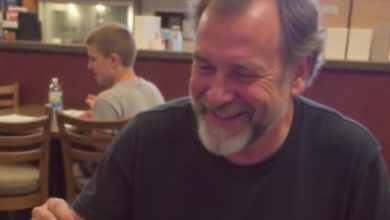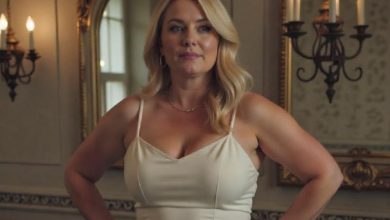After the divorce, my father always put his new step-kids first — so my graduation party gave him a shock he never saw coming.

I grew up believing my dad and I shared an unbreakable bond—until real life proved me wrong.
My parents split when I was four. The court agreement was simple: I lived with Mom during the week, and Dad got me on weekends. In those early years he tried hard to keep our routine steady. He phoned every few days, picked me up on Saturday mornings for pancakes and cartoons, then brought me back Sunday evening after helping with homework or reading me a bedtime story over the phone. Even though he no longer slept under our roof, he still felt like Dad—my constant, my hero.
Then Dad met Jane.
Jane was bright and outgoing, with three kids from her previous marriage: Logan, Tyler, and Emma. Almost overnight Dad’s modest house turned into their playground, and I began to feel like an overnight guest. At first he tried to merge everyone—game nights, backyard barbecues, and big birthday cakes. Yet their inside jokes flew right over my head, and the new group traditions had no room for me. One afternoon they painted a big family canvas—everyone pressed colorful handprints onto the beige fabric and wrote their names under each print. When Dad showed it to me, my handprint was missing. He acted as if he simply “ran out of space,” but the empty spot felt loud.
I told myself it was just a rocky adjustment, that things would balance out. Instead, the excuses began piling up. My weekend pickups turned into apologetic calls.
“Pumpkin, Logan has a soccer match; we’ll have to skip today.”
“Tyler’s asked to visit the trampoline park—maybe next time?”
When I suggested a little father-daughter outing, he always replied, “We already did something fun with the family this week, sweetie. Be glad we include you.” The message was clear: I was selfish for wanting my own time with him.
By the time I turned thirteen I had saved up babysitting money for a concert. It was a band Dad and I had danced to in our kitchen years earlier. I bought myself a ticket and called to ask if he could get his, too. He sounded excited. “You and me, kiddo—just like old times.” That hope lasted exactly six days. Three nights before the show he rang.
“Pumpkin, Emma’s been begging me to paint her bedroom princess pink. I spent the concert money on paint and brushes. You understand, right?”
My throat tightened, but he couldn’t hear disappointment over the phone.
Not long after, I fell from the old oak tree in Mom’s yard and fractured my arm. At the hospital I kept staring at the swinging doors, convinced Dad would burst through any second. He never came. Mom sat by my bed and said softly, “Your dad’s tied up today, honey. He asked me to tell you he’s proud you were brave.” Proud of what—gritting my teeth without him?
Only later did I find out Jane’s youngest had a minor tonsil surgery that same day. Dad chose a routine procedure over my broken bone.
When I tried explaining how hurt I felt, he called me jealous. “It’s not always about you,” he said, scolding me for daring to need attention. I swallowed my tears and promised never to mention it again.
Mom, by contrast, never faltered. She took extra shifts to keep us afloat, learned fancy braids from internet videos, and sat on the couch during my midnight anxiety spirals until I fell asleep. She clapped louder than anyone at school plays, even after a ten-hour workday.
Then came the eighth-grade field trip to Washington, D.C. — something I’d dreamed about for years. The fee wasn’t small. I didn’t want Mom to shoulder the cost, so I called Dad. He happily agreed to pay half. I told my history teacher I was definitely going. Two weeks before the payment deadline he called again.
“Pumpkin, the twins are turning ten. Jane and I are renting a bounce house. That thing is pricey. I’ve got to redirect the money. You get it, right?”
Right. It was the moment the lightbulb flipped on. I realized I was Dad’s optional task, a line item he could erase.
In the end Mom made the trip happen—she borrowed money, baked cupcakes for neighbors, and sold a few old pieces of furniture. She never once mentioned the sacrifice, but I noticed. That day I decided: no more chasing a father who kept losing track of me.
Time rolled forward to senior year. My grades climbed, my part-time job covered test fees, and I secured admission to my dream college. Mom shrieked in the kitchen when the acceptance email arrived; Dad sent a short “Congrats, proud of you” message.
Yet he surprised me by offering cash for my graduation party. I accepted, carefully tucking away hope but still bracing for another letdown. One week before the party he called.
“Look, Tyler’s getting bullied at school. Jane and I think a shopping spree might boost his confidence. Mind if I use the party money for that? He needs it more than you do.” There it was again: that tone telling me to be the noble one, the bigger person.
For the first time I refused. “Actually, that won’t work,” I said—and hung up before guilt could creep in.
Two evenings later I drove to Dad’s house, unopened envelope in hand, planning to return the contribution he’d promised but wouldn’t deliver. Jane opened the door with a polite smile that didn’t reach her eyes. Inside, Logan and Tyler argued over buttons on the game console, and Emma painted glitter onto her nails.
Dad emerged from the kitchen, drying his fingers on a dish towel.
“What’s up, pumpkin?”
I held out the sealed envelope. “I won’t be needing this after all. Thanks anyway.” I didn’t stick around for protests. I simply left.
Graduation day dawned humid and bright. The gym smelled of fresh flowers and acoustic feedback from the sound system. Families waved balloons and air horns. Mom grabbed front-row seats, her grin wide enough to hurt cheeks. Next to her sat Mike—Mom’s boyfriend of the past twelve months.
Mike wasn’t flashy, but he was solid. He’d driven me to college interviews, stayed up practicing speeches, and proofread essays when Mom needed sleep. He never claimed a replacement title; he only asked, “What do you need?”
Our school had a tradition: top graduates could choose a parent or mentor to accompany them onstage during the awards moment. When my name echoed through the speakers, I rose, smoothing the navy gown over my knees.
From the corner of my vision I saw Dad stand in the bleachers. He straightened his tie, ready to stride forward—certain I would beckon him. I raised my eyes, offering no nod of invitation.
Instead Mike quietly walked to my side. He extended his steady hand, giving me a small encouraging smile. The entire gym seemed to hold its breath.
Dad froze mid-aisle, color draining then flooding back red. He panicked when he realized what was about to happen.
He stomped toward the stage, voice slicing the hush. “Excuse me! Who is that? I’m her father! I should be up there!”
I turned, letting the entire audience witness our standoff. “Oh, you remember you’re my dad now?” I said, calm but firm. “Kind of late. You had ten years to step up, but a stage and spectators finally jogged your memory?”
His lips worked soundlessly, complexion darkening. “You’re humiliating me! After everything I’ve done!” he hissed.
I let out a single short laugh. “Everything? Like skipping the hospital when I broke my arm? Choosing paint supplies over our concert? Taking back party money so Tyler could buy new sneakers?”
He scanned the crowd, hoping for support. Jane sat silent, eyes fixed on the floor. The stepkids stared at their shoes.
“You’re being dramatic,” he muttered.
“No,” I corrected. “I’m finally done being invisible. Today I’m standing with someone who shows up, not someone who treats me like an errand.”
He fidgeted, suddenly small beneath the lights. “Unbelievable. I raised you,” he said, voice shaky.
Mom’s face flashed in my mind—double shifts, braid tutorials, midnight cocoa. “Actually, Mom raised me,” I said, tilting my head toward her. “And lately, so did he,” I added, gesturing to Mike. “The man who drove interstate for college visits, who listened to me cry at two in the morning, and who never made me feel like a weight around his neck.”
Dad’s shoulders sagged. No one came to his rescue. The only sound was the squeak of his loafers as he backed away.
“So that’s it?” he whispered. “I get replaced?”
I didn’t bother answering. His actions had already spoken. Sometimes consequences wear graduation caps and stand arm in arm with somebody else.
I faced Mike again. He squeezed my hand. “Ready?” he asked.
“More than ever,” I replied.
Together we crossed the stage. The principal handed me my diploma, camera flashes burst, and the cheers from Mom and Mike rang louder than any I’d ever heard.
As we stepped down, I felt lighter. Not a forgotten kid, not a backup plan, but a young woman whose worth was finally reflected back in the people who chose her—people like Mom and Mike.
Later that evening our small backyard shimmered with fairy lights strung by friends. Mom grilled burgers; Mike flipped veggie patties for my vegetarian pals. My history teacher dropped by to say she’d never seen a prouder walk across a stage. I thanked her and glanced at the closed gate—Dad never arrived. Jane sent a polite text: “Sorry, family obligation.” I didn’t feel angry. Just relieved he wouldn’t cast another shadow over the night.
Before cake, Mike clinked a fork against his glass. “I’m not big on speeches,” he said, “but I need two sentences. First: your hard work put that diploma in your hand. Second: thank you for trusting me enough to let me walk beside you today.”
My throat tightened. Everyone applauded. Mom wiped a tear, then laughed when frosting smeared on her finger. For years I had chased applause from one person who wouldn’t clap. Funny how a single steady hand on my shoulder felt louder than any stadium roar.
A few weeks later envelopes from the university arrived—housing forms, meal-plan brochures, orientation schedules. I filled them out with Mom at the kitchen table. Mike wandered in carrying a toolbox. He spent the afternoon helping tighten screws on the old desk I wanted to take to my dorm.
While sorting files, I found Dad’s last unopened letter. I turned it over, undecided. Then I slid it into my memory box: not to cherish, just to keep the record straight. Past is past; lessons learned.
Move-in day came. Mom drove the packed car, Mike followed in his truck hauling my desk. They helped me set up fairy lights and a small fridge. They hugged me goodbye, both promising Sunday video calls. I believed them.
That night, in my new room, I opened my laptop and framed two photos on the desk. One was little me on Dad’s shoulders back when he still made promises. The other was graduation day—me shaking hands with Mike while Dad stood frozen in the aisle. I wasn’t angry looking at either picture. The first reminded me people can change for worse if they stop trying; the second reminded me others step up when you least expect it.
I shut off the lamp and whispered to the dark ceiling of the dorm just as I had to my childhood one: “Here we go.” Only this time my voice carried hope, not fear.
And that’s how my father discovered what consequences look like—dressed in a cap and gown, holding someone else’s steady hand, and choosing to walk forward without him.



